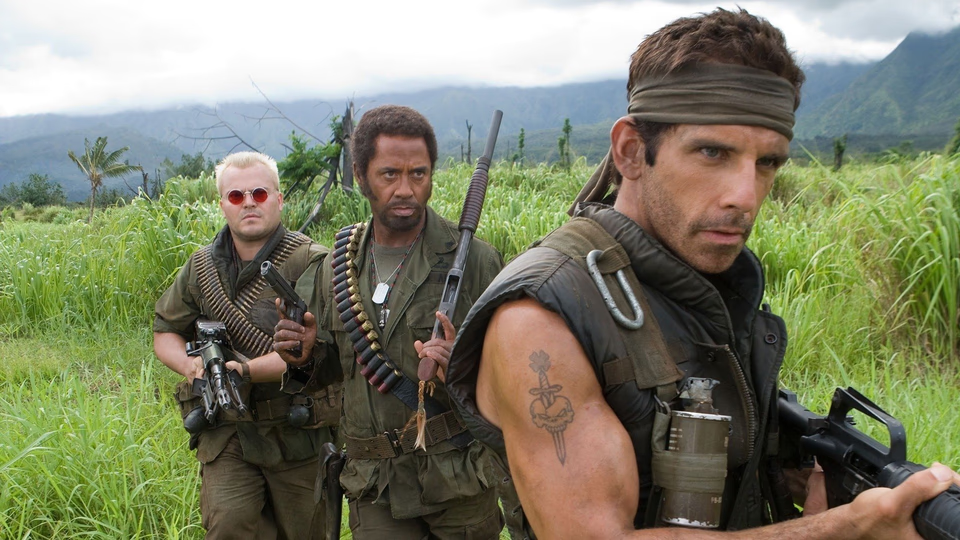Tropic Thunder

Ben Stiller sprints toward the camera. Behind him, an explosion propels him toward us. Then, another blast throws him sideways out of frame. It’s a shot lifted wholesale from Mission: Impossible III, but it still thrills.
That tells you everything about Tropic Thunder, a satire that refuses to apologize for being entertaining.
The setup is simple. Three pampered actors get dropped into real jungle warfare while filming a Vietnam War movie. Stiller’s fading action star, Robert Downey Jr.’s method actor in blackface, Jack Black’s fart-comedy specialist. They think they’re still making a movie. The bullets are real.
What could have been a one-joke premise becomes something richer. Stiller understands that Hollywood’s greatest sin isn’t making bad movies—it’s taking itself too seriously while making them.
The film opens with a fake commercial and trailers. Brandon T. Jackson hawks “Booty Sweat” energy drinks, Stiller stars in summer blockbuster Scorcher VI, Downey Jr. in an Oscar-baiting period piece Satan’s Alley, Black in a sequel that makes The Nutty Professor look restrained. These aren’t just clever—they’re surgical strikes against every type of Hollywood vanity.
Then comes the genius move. When the action turns “real,” Stiller doesn’t abandon the spectacle. He doubles down. The explosions are bigger, the stunts more elaborate, the violence more visceral. The film becomes the very thing it’s mocking—and earns the right to do so.
Downey Jr. gives the film’s most fearless performance. His Kirk Lazarus is an Australian who undergoes a “controversial pigmentation procedure” to play an African-American soldier. In lesser hands, this would be disaster. Downey Jr. creates a brilliant hall of mirrors, satirizing method actors, racial assumptions, and Hollywood’s clumsy attempts at authenticity all at once.
The film’s sharpest moment: Stiller addresses the group as “you people.” Downey Jr.’s character responds indignantly, “What do you mean, ‘you people’?” To which Brandon T. Jackson’s African-American character replies with astonishment, “What do you mean, ‘you people’?”
Even more surprising is Tom Cruise’s volcanic cameo as studio executive Les Grossman, a bald, overweight bully with a penchant for hip-hop dancing. It’s an outrageous performance that seems to will itself into existence through sheer force of Cruise’s commitment. That Stiller coaxed such fearless work from both Downey Jr. and Cruise speaks to his skill in creating an environment where his actors feel safe to take enormous risks.
This is what separates Tropic Thunder from lesser comedies. It doesn’t sneer at its targets. It understands them. The best satire comes from affection, not contempt. Stiller loves movies—even bad ones—and that love shows.
The film walks a tonal tightrope most comedies wouldn’t dare attempt. It’s both parody and spectacle, satire and sincere entertainment. It argues that Hollywood’s manufactured excitement can be genuinely exciting, that artifice doesn’t negate authenticity but can enhance it.
Today’s movies seem to only offer mindless spectacle or politicized intellectualism. Tropic Thunder reminds us there was once a third path. Movies that were smart without being smug, entertaining without being empty, comedies that earned both their laughs and their thrills.